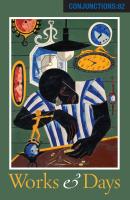![[A Reading by Karan Mahajan]](http://www.conjunctions.com/images/event_image.php?id=134159)
On Monday, February 26, at 2:30 p.m. in Weis Cinema, Bertelsmann Campus Center, novelist Karan Mahajan reads from his work. Presented by the Innovative Contemporary Fiction Reading Series, introduced by novelist and Bard literature professor Bradford Morrow, and followed by a Q&A, the reading is free and open to the public; no tickets or reservations are required.
Karan Mahajan studied English and economics at Stanford University before earning an M.F.A. in fiction from the Michener Center for Writers. His first novel, Family Planning (2012), was a finalist for the International Dylan Thomas Prize. His second novel, The Association of Small Bombs (2016), won the Bard Fiction Prize, the Anisfield-Wolf Book Award for Fiction, and the NYPL Young Lions Award and was a finalist for the National Book Award, in addition to being named a Best Book of the Year by the New York Times Book Review, New York Magazine, Esquire, Buzzfeed, Huffington Post, and others. In 2017, Mahajan was selected as one of Granta’s Best Young American Novelists.
PRAISE FOR KARAN MAHAJAN
“The Association of Small Bombs is wonderful. It is smart, devastating, unpredictable, and enviably adept in its handling of tragedy and its fallout. . . . Mahajan is the real deal.” —Fiona Maazel, New York Times Book Review
“A voracious approach to fiction-making . . . Mahajan has a cinematic attunement to the spectacle of disaster.” —New Yorker
“Mahajan is an incredibly assured stylist. . . . Hugely promising.” —Jay McInerney, Daily Beast
“Even when handling the darkest material or picking through confounding emotional complexities, Mahajan maintains a light touch and a clarity of vision.” —London Review of Books
“Mahajan . . . has already developed an irresistible voice with a rich sense of humor fueled by sorrow.” —Washington Post Book World
“A voracious approach to fiction-making . . . Mahajan has a cinematic attunement to the spectacle of disaster.” —New Yorker
“Mahajan is an incredibly assured stylist. . . . Hugely promising.” —Jay McInerney, Daily Beast
“Even when handling the darkest material or picking through confounding emotional complexities, Mahajan maintains a light touch and a clarity of vision.” —London Review of Books
“Mahajan . . . has already developed an irresistible voice with a rich sense of humor fueled by sorrow.” —Washington Post Book World
